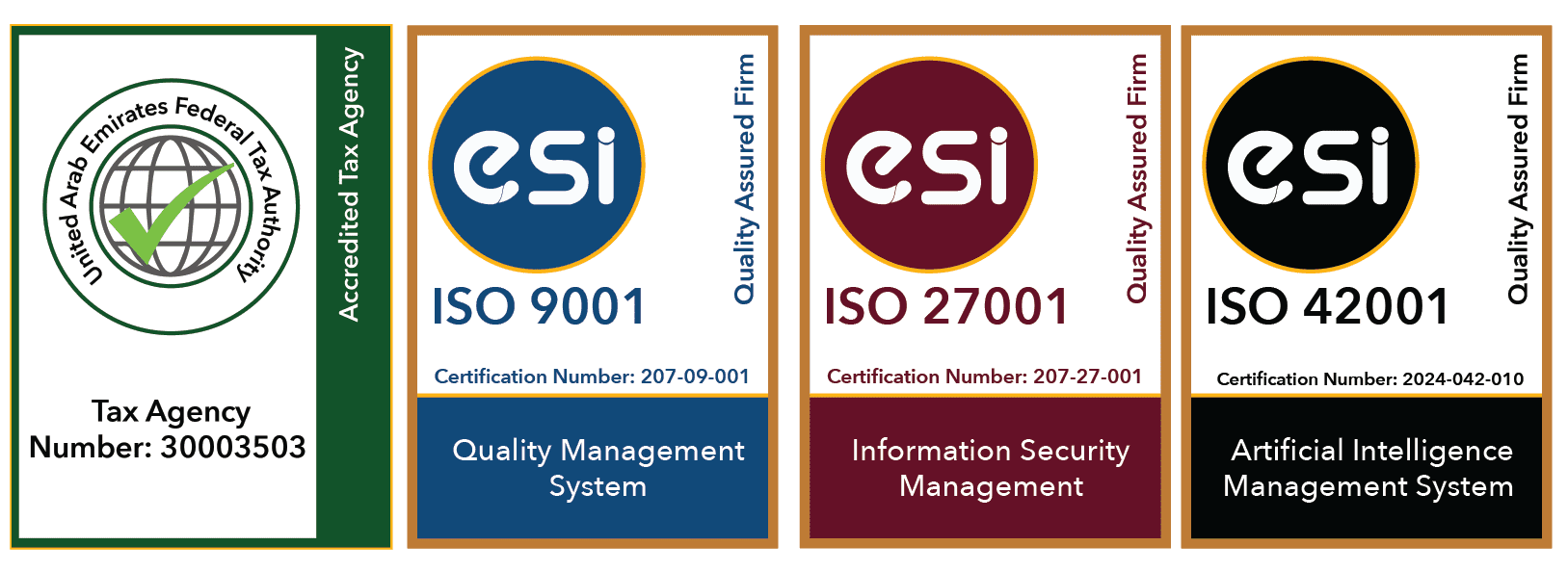Free Zone Companies – Corporate Tax Obligations
01 Jun, 2023 / Haroon Juma / Corporate Tax

What Obligations Are Incumbent On Free Zones?
UAE Free Zones have played a key role in driving UAE’s economic development and foreign direct investment. Free Zones have been a popular incorporation strategy for many businesses attracted by exemptions from corporate and income tax.
Over the last few years, legislation has been enacted by the Ministry of Finance (MoF) as part of the UAE’s desire to comply to global best practices which specifically affect Free Zone company’s compliance and tax obligations. In this article, we summarise the key obligations on all Free Zone companies and assure continued benefits tax free eligibility and meet necessary compliance.
Corporate Tax
In order to retain the attractiveness of Free Zones, the recent UAE Corporate Tax Law (CT Law) seeks to strike a balance between Free Zone regulators to honour their corporate tax exemption status and ensuring that the companies are not artificially created purely for tax avoidance purposes
Therefore, the Corporate Tax Law defined a category of a so-called “Qualifying Free Zone Person”, a company registered in a Free Zone, which will be able to retain the tax exemption (0% corporate tax rate) for the remainder of the period stipulated in the applicable legislation of the Free Zone. In addition, under the Corporate Tax Law, this period can be extended by the decision of the Cabinet but no longer than 50 years.
What Conditions Must Be Satisfied To Retain 0% CT Rate?
To be considered a Qualifying Free Zone Person, the Free Zone company must:
● Maintain adequate substance in the UAE (in line with the UAE economic substance requirements);
● Derive “Qualifying Income”;
● Not elected to be subject to Corporate Tax at the standard rates; and
● Comply with the transfer pricing (“TP”) requirements under the Corporate Tax Law.
If a Qualifying Free Zone Person fails to meet any of the conditions or makes an election to be subject to the regular Corporate Tax regime, it will be subject to the 9% corporate tax rate.
What is Qualifying Income?
Free Zone businesses can benefit from 0 per cent corporate tax applied on ‘all activities’ related to transactions with other free zone entities.
Under the Decision, this would include:
- Income derived from transactions with other free zone Persons, except for income from ‘excluded activities”
- Income derived from transactions with any person – domestic and foreign – in the case of “qualifying activities’, except for income from excluded activities.
In addition, the Decision introduces an additional benefit to allow a small amount of revenue for non-qualifying income, the ‘de-minimis’
A Free Zone entity can earn a small or incidental amount of non-qualifying income – without being charged under corporate tax. The ‘de-minimis’ threshold must not exceed the lower of Dh5 million or 5 per cent of total revenues. (De-minimis in tax parlance relates to amounts deemed small or marginal.)
Free zone qualifying activities
The free zone corporate tax coverage applies only to income derived from activities performed exclusively in or from within such an entity.
This is reflected in the definition of ‘qualifying income’, which includes income derived from transactions with other free zone persons as well as domestic and foreign sourced income from conducting any of the ‘qualifying activities’
These include:
• Manufacturing of goods or materials;
• Processing of goods or materials;
• Holding of shares and other securities;
• Ownership, management, and operation of ships;
• Reinsurance services;
• Fund management services that are subject to the regulatory oversight of the competent authority in the UAE;
• Wealth and investment management services that are subject to the regulatory oversight of the competent authority in the UAE.
• Headquarter services to related parties;
• Treasury and financing services to related parties;
• Financing and leasing of aircraft,
• Logistics services;
• Distribution in or from a designated zone that meets the relevant conditions; and any activities that are ancillary to the above-mentioned activities.
Excluded activities
Income from certain specific ‘excluded activities’ will not be treated as ‘qualifying income’ regardless of whether the income is derived from a free zone entity or as part of undertaking a ‘qualifying activity’.
This includes:
• Income derived from transactions with individuals;
• Income derived from certain regulated financial services activities;
• Income derived from intangible assets;
• Income derived from immovable property, other than transactions with free zone enterprises in relation to commercial immovable property located in a free zone.
Earning income from ‘excluded activities’ or earning any other income that is not ‘qualifying income’ will disqualify the free zone person from the regime.
What is defined as “Substance”?
This Decision also clarifies provides clarity to the nature of Substance to attain status as a Qualifying Free Zone Person.
• A Qualifying Free Zone Person shall undertake its core income-generating activities in a Free Zone
• Have adequate assets, an adequate number of qualified employees, and incur an adequate amount of operating expenditures.
• Activities can be outsourced to a Related Party in a Free Zone or a third party in a Free Zone, provided the Qualifying Free Zone Person has adequate supervision of the outsourced activity.
Additional decisions are expected on the specific implementation rules in due course.
Is Transfer Pricing Relevant?
Subject to further Ministerial Decisions specifically on Qualifying Free Zone Person and exemption citeria, a Free Zone company may need to apply the arm’s length principle for transactions with related parties (meaning that the transactions with its related parties are being carried out at market conditions) and it may be obliged to fulfill the Transfer Pricing documentation requirements, i.e.
1. Filing a Disclosure Form
2. Preparing a Transfer Pricing Master File
3. Preparing Transfer Pricing Local File,
As discussed in our previous article, this is one of the conditions to be considered as the Qualified Free Zone Person.
Article 3.31 of the PCD elaborates on the deductibility of payments from related party mainland entities, however, it is not a requirement as per the CT Law. Potentially, this can mean that the payments of mainland-related entities will fall under the Qualifying Income, or, that as long as these payments are in line with the arm’s length principle, CT Law is not placing additional deductibility restraints.
There are further clarifications expected under Cabinet Decision(s). These are expected to clarify a number of material issues such as defining what would be considered as “Qualifying income”, confirming whether the Qualifying Free Zone companies that are not engaged in related party transactions absolve of the TP compliance requirements .
Compliance – Audited Financial Statements
Nothwitstanding any Regulatory Authority licensing requirements which are specified by each Authority, Ministerial Decision No. 82 of 2023 specifies a Qualifying Free Zone Person must maintain audited financial accounts. Therefore, audited statements are an obligation and should be satisfied.
Compliance – Economic Substance Regulations
Economic Subsatnce Regulation applies in the UAE for financial years commencing on or after January 1, 2019. The objective of CM Resolution No. 57 is to determine the requirements and set out the criteria to confirm that a licensee, carrying on an activity in the UAE, has economic substance. Under the resolution, a licensee that is not an exempted licensee must satisfy specified criteria in relation to any relevant activity carried on by it.
Our useful FAQs on ESR provide further details on applicability of the Legislation. Each licensee must conduct its annual assessment on income and whether they meet the ESR regulations for notification and reporting for each financial year.
If you operate and Free Zone and wish to maximise the eligible benefits and reduce compliance risks, we can provide a free consultation to ensure your business is optimizing for CIT.
About SimplySolved
As an FTA Accredited Tax Agency with ISO 9001 Quality, 27001 Information & 42001 Security Management Certification, we offer a quality-based approach to our services supported by a dedicated team of certified professionals.
Our offerings are specially designed to meet the UAE Regulations to put you in control, comply with the regulations and help you make better business decisions. With experience and local knowledge, we partner with our clients to find solutions and manage their risks about their challenges and objectives.
While this article provides high-level guidance, it is not a substitute for tax or legal advice, and we encourage you to seek advice regarding the specific matters that concern you. You may contact us for a no-obligation consultation if you wish to speak to us.

About SimplySolved
At SimplySolved, we save your time, resources, and costs. Whether you need help with Outsourced Accounting, Finance, Corporate Tax, Employee Management & Payroll and ERP & E-Commerce Integration. we have the expertise and solutions to help.
Subscribe to mailing list
Partner With SimplySolved
Serving over 300+ clients we know the challenges your business faces operating cost effective, compliant and efficient back office operations.
As an FTA Accredited Tax Agency with ISO 9001 Quality & 27001 Information Management Certification, we offer a quality-based approach to our services supported by dedicated team of certified professionals.
We support our clients with defined processes, platforms and expertise to deliver advisory, project and outsourced services in Accounting, Tax, Auditing, HRM & Payroll & ERP solutions. Our offerings are specially designed to meet the UAE Regulations to put you in control of your information, comply to the legislation and help you make better business decisions.
Copyright © 2024 | SimplySolved | All Rights Reserved.




